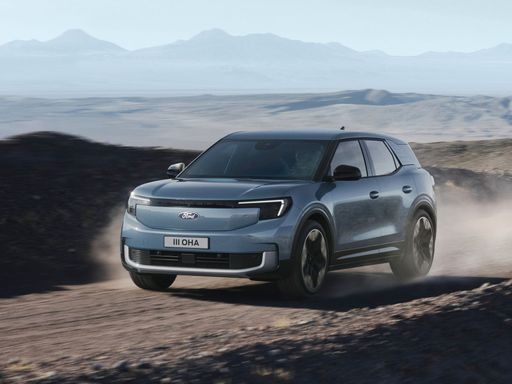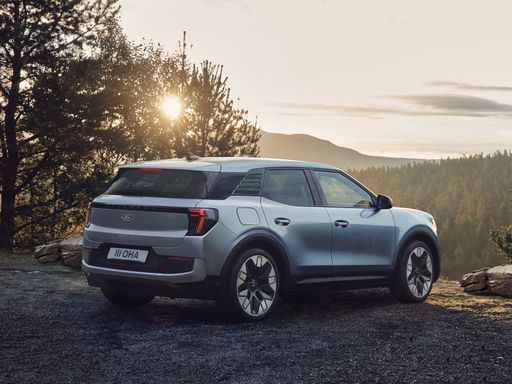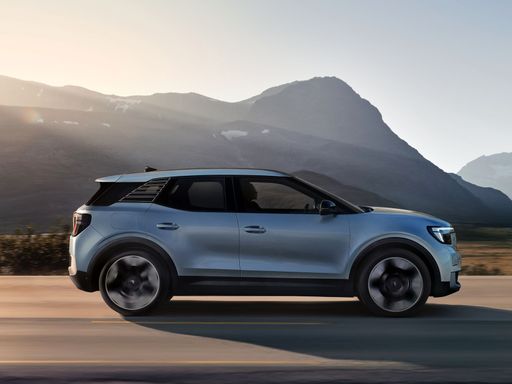Ford Explorer EV vs Toyota Yaris Cross - Differences and prices compared
Compare performance (340 HP vs 130 HP), boot space and price (34200 £ vs 23700 £ ) at a glance. Find out which car is the better choice for you – Ford Explorer EV or Toyota Yaris Cross?
Costs and Efficiency:
Price and efficiency are key factors when choosing a car – and this is often where the real differences emerge.
Toyota Yaris Cross has a decisively advantage in terms of price – it starts at 23700 £ , while the Ford Explorer EV costs 34200 £ . That’s a price difference of around 10509 £.
Engine and Performance:
Under the bonnet, it becomes clear which model is tuned for sportiness and which one takes the lead when you hit the accelerator.
When it comes to engine power, the Ford Explorer EV has a clearly edge – offering 340 HP compared to 130 HP. That’s roughly 210 HP more horsepower.
In acceleration from 0 to 100 km/h, the Ford Explorer EV is significantly quicker – completing the sprint in 5.30 s, while the Toyota Yaris Cross takes 10.70 s. That’s about 5.40 s faster.
In terms of top speed, the Ford Explorer EV performs minimal better – reaching 180 km/h, while the Toyota Yaris Cross tops out at 170 km/h. The difference is around 10 km/h.
Space and Everyday Use:
Cabin size, boot volume and payload all play a role in everyday practicality. Here, comfort and flexibility make the difference.
Both vehicles offer seating for 5 people.
In curb weight, Toyota Yaris Cross is significantly lighter – 1180 kg compared to 1908 kg. The difference is around 728 kg.
In terms of boot space, the Ford Explorer EV offers somewhat more room – 450 L compared to 397 L. That’s a difference of about 53 L.
In maximum load capacity, the Ford Explorer EV performs distinct better – up to 1422 L, which is about 325 L more than the Toyota Yaris Cross.
When it comes to payload, Ford Explorer EV slightly takes the win – 585 kg compared to 510 kg. That’s a difference of about 75 kg.
Who wins the race in the data check?
The Ford Explorer EV is far ahead overall in the objective data comparison.
This result only shows which model scores more points on paper – not which of the two cars feels right for you.
Costs and Consumption
View detailed analysis
Engine and Performance
View detailed analysis
Dimensions and Body
View detailed analysis

Ford Explorer EV
Ford Explorer EV
The Ford Explorer EV translates the familiar big‑American SUV presence into whisper‑quiet electric motoring, offering roomy seating and a tech‑forward cabin that will please families and road‑trippers alike. It drives with more composure than its boxy looks suggest, blending a comfortable ride and eager acceleration while undercutting the guilt of gas stops — a practical, modern alternative for buyers who want Explorer space with electric charm.
details


Toyota Yaris Cross
The Toyota Yaris Cross takes the jaunty personality of the Yaris and gives it a taller stance and a bit more practicality, so you get city-friendly agility with added SUV presence. It’s easy to live with, economical on the daily grind, and smartly packaged — a sensible pick for buyers who want fuss-free transport with a touch of character.
details






Costs and Consumption |
|
|---|---|
|
Price
34200 - 48800 £
|
Price
23700 - 34300 £
|
|
Consumption L/100km
-
|
Consumption L/100km
4.5 - 4.8 L
|
|
Consumption kWh/100km
14.5 - 17.2 kWh
|
Consumption kWh/100km
-
|
|
Electric Range
360 - 602 km
|
Electric Range
-
|
|
Battery Capacity
52 - 79 kWh
|
Battery Capacity
-
|
|
co2
0 g/km
|
co2
101 - 108 g/km
|
|
Fuel tank capacity
-
|
Fuel tank capacity
36 L
|
Dimensions and Body |
|
|---|---|
|
Body Type
SUV
|
Body Type
SUV
|
|
Seats
5
|
Seats
5
|
|
Doors
5
|
Doors
5
|
|
Curb weight
1908 - 2179 kg
|
Curb weight
1180 - 1290 kg
|
|
Trunk capacity
445 - 450 L
|
Trunk capacity
320 - 397 L
|
|
Length
4468 mm
|
Length
4180 mm
|
|
Width
1871 mm
|
Width
1765 mm
|
|
Height
1630 - 1639 mm
|
Height
1595 mm
|
|
Max trunk capacity
1417 - 1422 L
|
Max trunk capacity
1097 L
|
|
Payload
561 - 585 kg
|
Payload
485 - 510 kg
|
Engine and Performance |
|
|---|---|
|
Engine Type
Electric
|
Engine Type
Full Hybrid
|
|
Transmission
Automatic
|
Transmission
Automatic
|
|
Transmission Detail
Reduction Gearbox
|
Transmission Detail
CVT
|
|
Drive Type
Rear-Wheel Drive, All-Wheel Drive
|
Drive Type
Front-Wheel Drive, All-Wheel Drive
|
|
Power HP
170 - 340 HP
|
Power HP
116 - 130 HP
|
|
Acceleration 0-100km/h
5.3 - 8.7 s
|
Acceleration 0-100km/h
10.7 - 11.3 s
|
|
Max Speed
160 - 180 km/h
|
Max Speed
170 km/h
|
|
Torque
310 - 679 Nm
|
Torque
-
|
|
Number of Cylinders
-
|
Number of Cylinders
3
|
|
Power kW
125 - 250 kW
|
Power kW
85 - 96 kW
|
|
Engine capacity
-
|
Engine capacity
1490 cm3
|
General |
|
|---|---|
|
Model Year
2024 - 2025
|
Model Year
2024 - 2025
|
|
CO2 Efficiency Class
A
|
CO2 Efficiency Class
C
|
|
Brand
Ford
|
Brand
Toyota
|
What drive types are available for the Ford Explorer EV?
The Ford Explorer EV is available as Rear-Wheel Drive or All-Wheel Drive.
